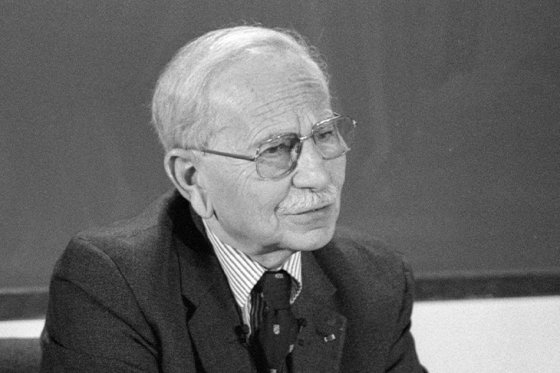Anatole Abragam (1914-2011)
Anatole Abragam was born in Moscow on December 15, 1914. He died on June 8, 2011 at the age of 96. A graduate of the École supérieure d'électricité, he was Director of Physics at the Commissariat pour l'énergie atomique from 1965 to 1970. Appointed Professor at the Collège de France in 1960, he held the Chair of Nuclear Magnetism until 1985.
Born in Moscow in 1914 into a Jewish bourgeois family, he spent his early childhood there, witnessing the first years of Soviet Russia.
At the age of ten, he emigrated to France with his mother and sister. His father, who remained in Moscow, was unable to join them in Paris until eleven years later. From his Russian childhood, he retained a perfect knowledge of the language, as well as the imprint of the Slavic soul, conveyed by the literature and poetry that accompanied him throughout his life.
Upon his arrival in France, he quickly adapted to a new world, learning to speak perfect French without an accent in just a few months. He went on to do brilliantly at the Lycée Janson de Sailly, distinguishing himself particularly in mathematics and Latin. With his baccalaureate in hand, he initially set his sights on medicine, the profession of his mother, one of Russia's first female doctors, but soon realized that he was not cut out for a medical career and decided after a year to study physics. Too independent-minded to submit to the discipline of preparatory classes, he chose the university route.
In the thirties, despite the presence of a few eminent professors, physics teaching in France only imperfectly reflected the effervescence and renewal of this discipline, which was mainly expressed in Anglo-Saxon countries and Northern Europe, where most of the scientists driven out of Germany by the rise of Nazism had taken refuge. Quantum mechanics was still little or poorly taught in Paris, and the young Anatole, with his keen, critical mind, was well aware of the limitations of the lectures on offer, and was unable to find a thesis supervisor in the Sorbonne of the time capable of directing him beyond his bachelor's degree, brilliantly obtained in 1936.
He was beginning to doubt his vocation when the war interrupted his studies. He lived through the phoney war and the German attack on the army, without his unit having to fight, and then went into hiding in the South, earning a living by giving lectures in Latin, mathematics and physics in private schools. He eventually took refuge in the hinterland of Grenoble, joining the Free French forces in the last year of the war.
At the age of thirty, at the Liberation, he had no profession or training in physics worthy of his ambition, but new opportunities were opening up to him in the hustle and bustle of France's reconstruction. Unwilling to return to the Sorbonne and its bad memories, he enrolled at the École supérieure d'électricité (Supélec), where he learned the basics of radioelectricity and radiofrequency technology, which had made immense progress during the war, and whose knowledge was to stand him in good stead later on. In 1947, his engineering diploma opened the door to the newly-created French Atomic Energy Commission (Commissariat à l'énergie atomique). With three brilliant young Polytechniciens, he formed what they jokingly called the CEA's "Three Musketeers", enthusiastically making up for lost time by studying the great texts of quantum physics in depth, using their complementary skills to translate them from English, Russian and German.
Above all, he obtained two delegations from CEA management, enabling him to go abroad to complete his training as a researcher. At Oxford, between 1948 and 1950, he was introduced to electron paramagnetic resonance and wrote his thesis on an original theoretical work on the subject. Then at Harvard, between 1952 and 1953, he discovered nuclear magnetic resonance (NMR) with Edward Purcell, one of the pioneers of this discipline born in 1946.












